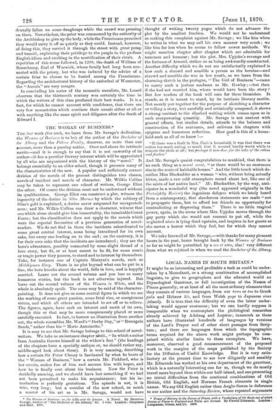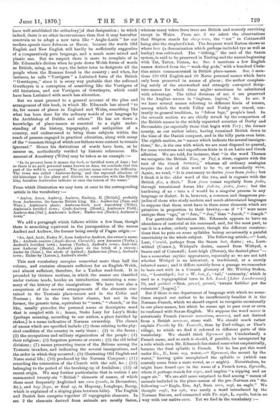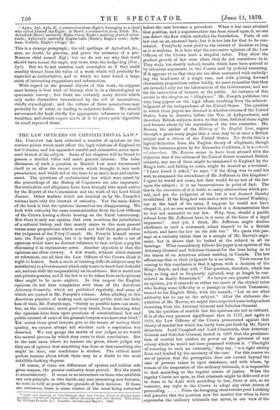LOCAL NAMES IN SOUTH BRITAIN.*
IT might be as interesting and profitable a task as could be under- taken by a Mezzofanti, or a strong combination of accomplished linguists, to give to geographers and the educated world an Etymological Gazetteer, or full investigation of the Names of Places generally, or at least of all the most ordinary elements that they contain of various languages, from our town or ton to Greek polls and Hebrew kir, and from Welsh ynys to Japanese sinta (island). It is true that the difficulty of even the latter under- taking would appear enormous ; but we can hardly suppose it insuperable when we contemplate the philological researches already achieved by Adelung and Lepsius ; inasmuch as these authors have illustrated hundreds of languages by versions of the Lord's Prayer and of other short passages from Scrip- ture ; and there are languages from which the topographic terms required for the above work might perhaps be com- prised within similar limits to these exemplars. We have, moreover, observed a good commencement of the proposed work in the margins of the maps published by the Society for the Diffusion of Useful Knowledge. But it is very satis- factory at the present time to see how diligently and sensibly Mr. Edmunds has worked at his own department of the gazetteer, which is a naturallyinteresting one for us, though we do mostly travel more beyond than within our half-island, and one presenting no trivial difficulties from the continual combinations of Old British, Old English, and Norman French elements in single names. We say Old English rather than Anglo-Saxon in deference to our author and the Saturday Review, whose repeated arguments • Traces of History in the Names of Places, with a Vocabulary of the Roots out of which Names of Places in England and Wales are formed. By Flayell Edmunds. London Longmans, Green, and Co. 1869.
have well established the orthodoxy:of that designation ; in which indeed, there is no other inconvenience than that it may hereafter constrain us to adopt a new term like " Anglo-Latin " for our modern speech since Johnson or Bacon, because the words Old English and New English will hardly be sufficiently suggestive of a comparatively pure language, and a much more mixed and plastic one. But we suspect there is more to complain of in Mr. Edmunds's diction when he puts down Welsh forms of words as British, using, as he says, the latter term to designate all the people whom the Romans found in the country ; and when, for instance, he calls "Vortigern " a Latinized form of the British " Gwrtheyrn," since it is every way probable that the softened Gwrtheyrn is a corruption of something like the Vortigern of old historians, and not Vortigern of Gwrtheyrn, which could have been Latinized with much less alteration.
But we must proceed to a general account of the plan and arrangement of this book, in which Mr. Edmunds has aimed " to do, for names of places in England and Wales, something like what has been done for the ordinary words of our language by the Archbishop of Dublin and others." He has set down a knowledge of place-names as essential to a right under- standing of the history, topography, and antiquities of a country, and endeavoured to bring these subjects within the reach of persons engaged in practical education, along with many of the " common things of which our fathers were content to remain ignorant." Hence his derivations of words have been, as he assures us, methodically verified by historic references. His account of Amesbury (Wilts) may be taken as an example :—
" In its present form it means the burp, or fortified town of Ame ; but as there is no such personal name known as Ame, we conclude that this part of the word is corrupted. The ancient name solves the difficulty. The town was called Ambrose-byrig,' and the repeated allusions of old historians to the place and district in connection with the British king Aurelius Ambrosius indicate at once the reason of the name."
From which illustration we may turn at once to the corresponding article in the vocabulary :—
" Amber, Ames, Ambrey, Ambros, Embrey, B. [British], probably from Ambrosius, the famous British king. Ex.: Amber-ley (Suss. and Wore.), Ambrose's place ; Ambrose-burh, now Amesbury (Wilts), Ambrose's fortified town ; Croft-Ambrey (Hord.), Ambrose's Field ; Ambros-den (Oaf.), Ambrose's hollow ; Ember-ton (Bucks), Ambrose's town."
We add a paragraph which follows within a few lines, though there is something equivocal in the juxtaposition of the names Audred and Andrew, the former being surely of Pagan origin :-
"An, And, Andr, Ender N., from Andred or Andrew, the owner's name. Ex.: Andreds-ceastre (Anglo-Saxon Chronicle), now Ancaster (Yorks.), Androd's fortified town ; Anston (Yorks.), Andred's town ; And-efer, now Andover (Hants), Andred's place on the brink of a stream ; Ander-by (Line.), the abode of Andred ; Anders-ton (Dors.), Andred's town ; Ender-by (Leices.), Andred's abode."
This root vocabulary occupies somewhat more than half the volume, and contains elements sufficient for an English-Welsh, and almost sufficient, therefore, for a Yankee road-book. It is preceded by thirteen sections, in which the names are classified under various heads, besides an introduction containing a sum- mary of the history of the immigrations: We have here also a comparison of the several arrangements of the elements con- tained in the Teutonic place-names and in the Celtic and Norman ; for in the two latter classes, but not in the former, the generic term, equivalent to " town," " church," or the like, usually precedes the personal name or descriptive word that is coupled with it ; hence, Stoke Lacy for Lacy's Stoke (perhaps meaning, according to our author, a place fortified by stakes,) is a name indicative of Norman ownership. The classes of names which are specified include (1) those relating to the phy- sical condition of the country in early times ; (2) to the fauna ;
(3) the occupations and military organization of the people ; (4) their religions ; (5) forgotten persons or events ; (6) the old tribal
divisions ; (7) names preserving traces of the Britons among the Teutonic invaders, and indicating the several immigrations, and the order in which they occurred ; (9) illustrating Old English and Norse social life; (10) produced by the Norman Conquest ; (11) recording the connection of the Church with the soil, &c. ; (12) belonging to the period of the breaking-up of feudalism ; (13) of recent origin. We may further particularize that in section 1 are enumerated twenty-six " British" elements of names, of which those most frequently Anglicized are cum (combe, in Devonshire, &c.), and loop (hope, or final up, in Hopesay, Longhope, Bacup, which is explained of a sloping plain between hills). The English and Danish lists comprise together 37 topographic elements. In sec. 2 the elements derived from animals are mostly Saxon, I
whereas many taken from trees are British and scarcely surviving except in Wales. From sec. 3 we select the observations that Shipton stands for sheep town, the " cot " in Cotteswold being also the shepherd's hut. The frequent word Barton shows us where bere (a denomination which perhaps included rye as well as barley) was cultivated. The "tithing," the unit of the Saxon system, is said to be preserved in Tooting and the names beginning with Tat, Tatter, Totten, &c. Sec. 4 mentions a few English names derived from the " week-day gods," with a hundred Chris- tian saints commemorated in British place-names. Sec. 5 men- tions 150 Old English and 60 Norse personal names which have only been preserved in names of places ; the author complain- ing sorely of the overworked and strangely corrupted Scrip- ture-names for which these might• sometimes be substituted with advantage. The tribal divisions of sec. 6 are preserved in the Anglian names in " inghain, ingtou," &c. In sec. 9 we have several names referring to different kinds of tenure, among which the words Folley and Foxley are traced, con- trarily to general tradition, to " folcss lege," people's laud. In the seventh section we are chiefly struck by the comparison of the British names in the widely separated counties of Derby and Devonshire (as especially those that begin with Tor) ; the former county, as our author infers, having remained British down to the time of the Danish conquest, and in the hilly parte even later. The eighth section, on " names which indicate the several immigra- tions," &c., is the one with which we are most disposed to quarrel, for some venturous and superfluous hints in it on Latin and Greek affinities. We are told, for instance, that "in the word Thames we recognize the British Tam, or Taf, a river, cognate with the root of the Greek irovotu6;," whereas all ordinary analogies require the root of this word to be so, or secondarily rora. Again, we read, "It is customary to derive fossa from folio; but I think it is the elder word of the two, and is cognate with the British foe, a ditch." Now fossa comes regularly from folio, through transitional forms like fodi-ta, fodta, foga ; but the hardening of an s into a d would be a singular process iu any language or dialect. It is, however, a common and dangerous pre- judice of those who study modern and much abbreviated languages to suppose that these must have in them some elements which are primitive in proportion to their brevity,—as if " I " were more antique than " ego," or " Jem," " Joe," than " Jacob," " Joseph."
For particular derivations Mr. Edmunds appears to have an abundance of material at his command, and, for the most part, to use it in a sober, orderly manner, though the different construc- tions that he puts on some syllables betray occasionally a painful uncertainty in the whole subject. The following article,—" Lost, Lust, Cornish, perhaps from the Saxon lust, desire ; ex., Lust- withiel (Cornw.), Withyel's desire, named from Withyel, Saxon earl of Cornwall ; Lust-leigh (Devon), the desired place"— has a somewhat mythic appearance, especially as we are not told whether Withyel is an historical, a traditional, or a merely inferred name; and it differs notably from a passage we remember to have met with in a Cornish glossary of Mr. Whitley Stokes, viz., " Lostuthyel ; lost = IV. lost, f., ' tail,' extremity,' which is used as a topographical term in Lib. Land. [Liber Landavensis] 70, and guithiel =. Bret. gwezel, g wazel, terrain fertilbui par des ruisseaux' [Legon]."
But if there is one department of language with which we some- times suspect our author to be insufficiently familiar it is the Norman-French, which we should expect to recognize occasionally in our place-names, but which he seems apt to pass over or even
to confound with Saxon-English. We suppose the word manor is
notoriously French (manoir matierium, manere), and not derived from a British maen-or, stone wall. We should much rather explain Turville by Fr. Tourville, than by Turf-village, or Thor's village, to which we find it referred in different parts of this vocabulary. We should think Bgrenwnt (in Cumberland) a
French name, and as such it should, if possible, be interpreted by a rule which even Mr. Edmunds has stated somewhat emphatically, because the final syllable is French. Yet he has put this word under Ea., E., from aeg, water,—" Egremont, the mount by the water," leaving quite unexplained the syllable re (which cats scarcely come from a mere vowel, as er might). Nevertheless, he might have found egre in the name of a French town, Egreuille, where it perhaps stands for aigre, and implies "a nipping and an eager air." IVe are still more surprised to find among " names of animals included in the place-names of the pre-Norman era " the following :—" Eagle, Ern, Ayl, from aern, aegl, an eagle." We thought eagle, for egle, was surely a word introduced by the Norman Barons, and connected with Fr. aigle, L. aquila, but in no way with our native earn. Yet we find in the vocabulary :— Ayles, Ayl, Ayls, E., a contraction fromiEgle's, belonging to a chief who called himself the Eagle: in Heref, a contraction from Athel. Ex., Aylesford (Kent), anciently IEgles-threp, Eagle's meeting-place of cross- roads ; Aylesbury, anciently Aegles-burh (Bucks), Eagle's town; Ayls- ham, Norfolk, Eagle's village," &c.
This is a strange paragraph ; the old spellings of Aylesford, &c., may, no doubt, be genuine, and prove the existence of a pre- Norman chief named /Egl ; but we do not see why that word should have meant the eagle, any more than the hedge-hog (Ger., lgel). But we do not mention sach oversights as if they could sensibly detract from the value of a work which will probably be regarded as authoritative, and in which we have found a large stock of interesting suggestions and information.
With regard to the general objects of this work, we suppose most history is best read as' history, that is, in a chronological or systematic survey ; but there are certainly many details which only make themselves remembered by the aid of associations, -chiefly etymological ; and the culture of these associations may probably be of value as leading to inductive habits. We should recommend the book chiefly for appropriate references in various localities, and should expect much of it to prove quite digestible in small repeated doses.
































 Previous page
Previous page